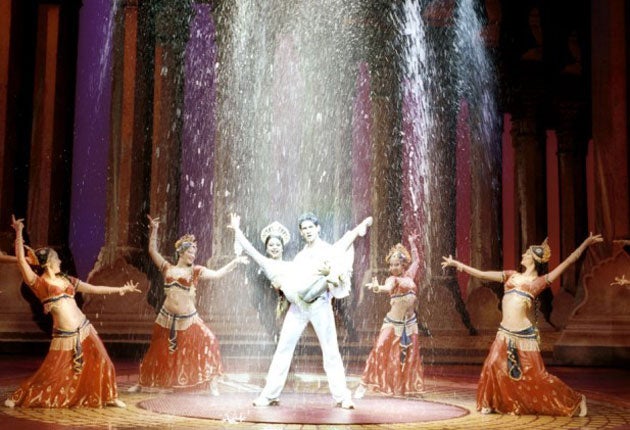Why theatre is still all white on the night
Theatre audiences are becoming more diverse, but British-Asians are still far from stage-struck, says Farhana Shaikh

Your support helps us to tell the story
From reproductive rights to climate change to Big Tech, The Independent is on the ground when the story is developing. Whether it's investigating the financials of Elon Musk's pro-Trump PAC or producing our latest documentary, 'The A Word', which shines a light on the American women fighting for reproductive rights, we know how important it is to parse out the facts from the messaging.
At such a critical moment in US history, we need reporters on the ground. Your donation allows us to keep sending journalists to speak to both sides of the story.
The Independent is trusted by Americans across the entire political spectrum. And unlike many other quality news outlets, we choose not to lock Americans out of our reporting and analysis with paywalls. We believe quality journalism should be available to everyone, paid for by those who can afford it.
Your support makes all the difference.When was the last time you were at the theatre and you sat next to someone who didn't happen to be white? Schemes such as tickets for a fiver and free tickets may well have attracted young professionals to theatre but its done little to reach out to ethnically diverse audiences. When it comes to theatre, it appears that British-Asians just aren't interested. So why do so few Asians visit the theatre?
I have asked the question via Twitter and Facebook. One blogger replies: "For me, theatre is a real luxury its not so much about the money but the time." This is typical of the responses I get from tech-savvy Asians who are riding the social media wave to market themselves and their businesses. British-Asian audiences may be happy to spend three and half hours absorbed in the latest Bollywood flick but "time" or lack of it, is cited as the most common reason for not visiting the theatre. Yet most plays average about the same duration as a Bollywood movie and on average cost only a few quid more. Out in the real world, I hear every "excuse" in the book but also calls for plays to have variety in their content. As Ferdous Khan, a Midlands primary school teacher, puts it: "There needs to be more diverse plays on offer. I would visit more but the listings just don't appeal to me."
A number of theatres branded under the term "Asian theatre"– Tamasha, Tara and Kali, probably the most famous among them – have had mild success in reaching out to British-Asians since the Nineties. Samir Bhamra, artistic director of Phizzical, an independent theatre company explains: "Theatre and dance are very much part of our cultural psyche – within our social circles, we love to have a chat and gossip session where there will be some form of mimicry and movement." Bhamra belives that it's a myth that Asians are not interested in theatre and the stats don't tell the whole story. "There is many a time I have seen hordes (of Asians) attend productions like Sus, The King and I, The Harder They Come, The Story Traders of Sichuan."
The last decade saw a phenomenal rise of Asian theatre and especially Bollywood-inspired theatre productions. Andrew Lloyd Weber's production of Bollywood Dreams, ran successfully for over two years in London's West End. It paved the way for a number of successfully run productions from Nottingham Playhouse's Bollywood Jane and more recently, The Merchants of Bollywood. But the popularity of the family sing-song, big fat family wedding and colourful apparel appears to be waning. Bhamra is moving away from developing Bollywood-inspired plays, "to give his audience what they want, something which reflects their everyday experiences."
Sharmila Chauhan, a London-based writer feels that theatre has become more about putting bums on seats than developing work that is truly artistic. "Theatre in England is embedded in a long tradition of how theatre should be. This can be a great thing but can also be stifling at times." But times are changing and there has been work that takes the risk and goes against the norm. Alia Bano's Shades – a play about a single Muslim woman from London, which was produced by the Royal Court, went down well with critics and audience alike.
Perhaps Asians crave reality and want to explore their own identities through theatre. Rabiah Hussain recently completed the Royal Court's new writers programme, which reaches out to aspiring Muslim playwrights under the age of 26 – and taps into capturing this authentic voice and cultivating young talent. She says the opportunity has opened up a new world for her. "Theatre is definitely changing. There is more of a focus on socially aware plays about Asians and not just Bollywood-inspired musicals which do not reflect the lives of British-Asians or deal with issues that affect them. I think there is still a long way to go to attract more Asian audiences."
Join our commenting forum
Join thought-provoking conversations, follow other Independent readers and see their replies
Comments